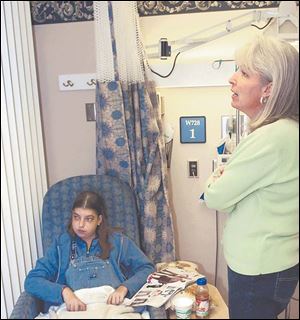
Bryan woman looking to future after multiple-organ transplant
11/5/2005
Angie Mitchell, with her mother, Linda Mitchell, is ready for discharge from the hospital but will likely have to stay in the Pittsburgh area awhile longer for needed checkups.
BRYAN - Angie Mitchell didn't like the questions her teenage classmates asked about why she barely ate, yet her belly was hugely distended beyond her skinny frame.
Are you anorexic?
Are you pregnant?
She heard them over and over.
But worse than the questions were the silent stares that grew more frequent as her rare birth defect, which had never allowed her to eat or digest normally, led to liver failure, turning her skin yellow-green.
"At least say something. Ask me why I'm this color," Miss Mitchell remembers thinking when she would go out.
So after the 20-year-old Bryan-area woman got a rare transplant of abdominal organs in Pittsburgh in early September - a new stomach, small intestine, pancreas, large intestine, and liver - it's not surprising what seemed important to say on the phone to a longtime nurse back in Toledo.
"The first thing she told me was, 'My stomach is flat,'●" said Joyce Roe, a nurse with Dr. Robert Bobo, a pediatric gastroenterologist at Toledo Children's Hospital who has treated Miss Mitchell nearly all her life.
Tonight, Dr. Bobo and Nurse
Roe hope to see Miss Mitchell for the first time since her transplant surgery.
They plan to attend a benefit supper and auction for her at the Knights of Columbus hall in Bryan that is expected to draw more than 250 people and raise $10,000 to $15,000 for her expenses. The $30 tickets for the swiss-steak supper are sold out, but $10 tickets to enter the hall for a 7 p.m. auction and snacks remain.
Miss Mitchell was born with chronic intestinal pseudo obstruction, which made her stomach and intestines act as if they were blocked, although they were not. In her case, the problem was largely with the muscles of those organs. When she ate, food often simply sat in her stomach or intestines, barely moving or digesting and becoming stagnant.
When Nurse Roe pumped Miss Mitchell's stomach, food once came up that she had eaten two weeks earlier. And because food didn't move well through her body, her stomach grew huge and her bowels were distended, leading to almost constant abdominal pain. Once Nurse Roe removed 2 liters of fluid from her stomach - about eight times as much as a stomach should hold.
Food sitting inside her so long led to more problems. Fungus grew in her stomach, making her extremely sick. Her burps smelled like beer. And her body was never able to convert much of what she ate into the nutrition that it needed.
To keep her from starving, Miss Mitchell had tubes in her body so special fluids could be inserted directly into her veins every night. The cost of those tube feedings, which must be prepared under completely sterile conditions, is typically $100,000 to $150,000 a year, said Dr. Geoffrey Bond, a surgeon at University of Pittsburgh Medical Center who performed her transplant operation.
Those prices make abdominal transplant surgeries, which typically range from $150,000 to $250,000, cost-effective.
Miss Mitchell's transplant operation, however, was done simply to save her life. One of the risks of the type of tube feeding that she had been on most of her life is liver damage, and hers had started to fail.
By summer, Dr. Bond said he expects Miss Mitchell to be completely free of tubes, bags, and other medical apparatus and able to eat and digest normally.
That alone will allow her to do many of the things she's only been able to watch her friends do.
"She so wanted to be like any other kid out there: wanted to eat pizza and stay over with friends," Nurse Roe said.
Far more importantly, Miss Mitchell, who because of her condition and the side effects of its treatment underwent open heart surgery and the removal of her colon, spleen, and gall bladder before she became a teenager, has felt sick for most of her life.
Her mother, Linda, has lost track of how many times her daughter has been hospitalized. She maxed out two $1 million medical insurance policies before going on Medicaid as a child.
Miss Mitchell said she plans to thank the crowd at tonight's benefit for their support, and to urge organ donation. She hopes to become a veterinarian's assistant and wants to begin studies at home as her recovery progresses.
"I'm a big animal person," she said, adding that her pets include a dog, two cockatiels, two turtles, and many fish.
She graduated in 2003 from both Bryan High School and Four County Career Center's health occupations program and was employed as a home health aide for two years.
For the next few months, however, she likely will need to continue staying in the Pittsburgh area to be close to her physicians there for frequent checkups. Although she seems to be progressing well, transplants such as hers are so rare that few doctors are experts in the area.
Dr. Bond estimated that only 250 have ever been done anywhere in the world. The first such transplants were done in about 1990 when a new drug was approved that helps prevent rejection of transplanted organs.
Expenses associated with staying in Pittsburgh and medical costs not covered by Medicaid are among those that tonight's benefit is to help cover, said Kathy Pool, one of the organizers. In all, the group hopes to raise $45,000 over a year's time. They had $18,000 in donations going into tonight's benefit.
Contact Jane Schmucker at:
jschmucker@theblade.com
or 419-337-7780.